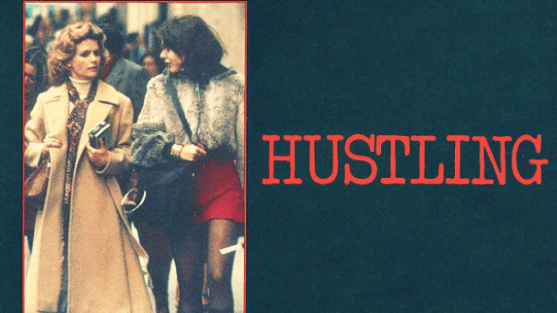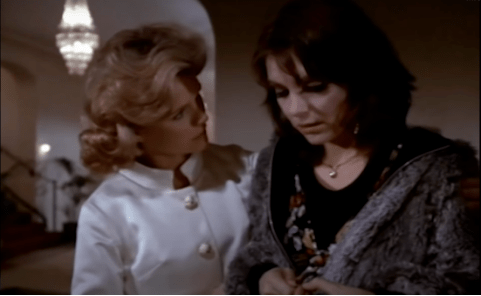ABOUT THE AUTHOR: Jennifer Upton is an American (non-werewolf) writer/editor in London. She currently works as a freelance ghostwriter of personal memoirs and writes for several blogs on topics as diverse as film history, punk rock, women’s issues, and international politics. For links to her work, please visit https://www.jennuptonwriter.com or send her a Tweet @Jennxldn

Chances are if a ‘70s movie was shot in any of The Boroughs of New York City during the 1970s, it will remain relevant and engaging today, if only because it represents a time in the city’s history when the grit, grime, spit and piss on the pavement was matched only by the interesting people standing on it in porn theater doorways and alleys leading to Heaven and Hell .
Hustling (1975) has more going for it than that, but it also contains a few baffling moments. Especially viewing it for the first time in 2023, when there are entire YouTube channels showcasing candid interviews with actual sex workers and pimps.
The made-for-TV movie, based on the book by Gail Sheehy, for whom Lee Remick’s character Fran Morrison acts as the author’s avatar, tells the story of a journalist covering the story of several sex workers in midtown Manhattan. In real life, Sheehy wrote the piece for The New Yorker. Here, it’s called New York Magazine. That piece was expanded into book form and the book was adapted for television.
Jill Clayburgh, in her breakout role, plays Wanda, a sex worker with a Brooklyn accent despite having grown up in Cleveland, Ohio. We follow her and her friend Dee Dee (Melanie Mayron) in their day-to-day existence, earning large amounts of cash they willingly hand over to their pimps lest they suffer the physical consequences. The women spend a lot of time in and out of jail. That’s where Fran meets Wanda, who at first refuses to speak with her on the record, and later changes her mind for $50 per hour. A tidy sum even today.

As Fran grows more attached to her subjects, she begins to feel pangs of guilt for exploiting them for content, but she never crosses the line into developing a full-blown savior complex. A refreshingly honest portrayal of parasitic journalists like Gail Sheehy, who earned a ton of money and won awards for the project while the subjects’ lives remained unchanged. Misery porn has always sold well with the bourgeoisie and sadly, continues to do so today.
Hustling portrays Sheehy as a typical example of a writer, who, regardless of their sex, lived such a privileged life that she misses the desperation that drove these women to sex work in the first place. Then, in turn, the two female screenwriters created street characters that are well-fed, free of drug and alcohol addictions and “bravely” living the lives that bored suburban stay-at-home parent of the day fantasized about.
It’s a good script overall, but some of the dialogue was way off base for the female experience, even in ’75 when the script was still so new it still smelled of typewriter ink. Take, for example, Fran’s bold statement, “There isn’t a woman alive who hasn’t had the fantasy of going into a room with a stranger and selling herself for money…or the nightmare.” Holy shit.
Because it’s a TV movie, it only shows a small portion of the spit, piss and grit of ‘70s. I’d love to see a harder-hitting theatrical adaptation of this book. One that allows audiences to smell the scenes as well as feel them. A movie that shows Dee Dee pissing in alleyways with her baby screaming in hunger in its stroller next to her. One that shows and the track marks on Wanda’s arms and that doesn’t wimp out on showing her getting beaten up by her pimp. One where the characters discuss their genital herpes and follows one of the main characters to a trick an hour after an abortion high on Ketamine.
Instead, we get a romanticized scene where Morrison looks on in amazement as Wanda berates the younger Dee Dee after social services take Dee Dee’s baby away and then pivots to cheering her up by making her dance to a song on the jukebox. Remick plays the scene well with eyes full of wonder, but I wonder…did Sheehy really need to get close to real life sex workers to fully grasp their humanity? Did she think they were animals before?
The success of this movie lies in the performances. Remick and Clayburgh excel. They filled the supporting cast with recognizable working actors from the day including Alex Rocco (The Godfather) and Jeffrey Kramer (Jaws, Halloween II) playing jaded cops and a pre-Rocky Burt Young as a sleazebag hotel proprietor who steals a stolen ring from Dee Dee.
The scenes at the police station are among the grittiest and best in the film, with the hopelessness of cleaning up the city’s corruption on full display. Of course there are untouchable politicians and businessmen bankrolling the sex trade and it’s the women made to suffer! Another big shock for Fran that further explores her naivety.

In the end, none of the powerful guys are held accountable, of course. Wanda goes back to her hometown to live with her brother but it’s not clear at all that she will succeed. For ‘70s New York City, nothing changes and the world rolls on.
Overall, it’s a good movie, but it’s also infuriating. It’s a view of street life as interpreted through the eyes of a journalist with a kink for what she thinks is a “brave” lifestyle but has no fucking clue the level of desperation required to enter the sex trade and the ferociousness required to survive it.
The film is available from Mill Creek or on YouTube here: